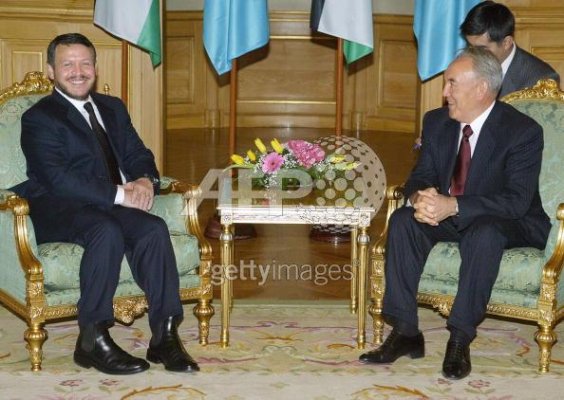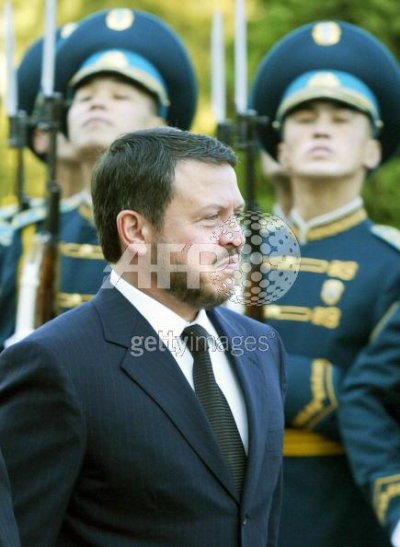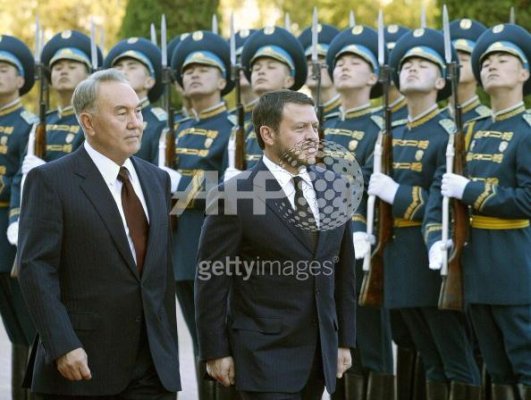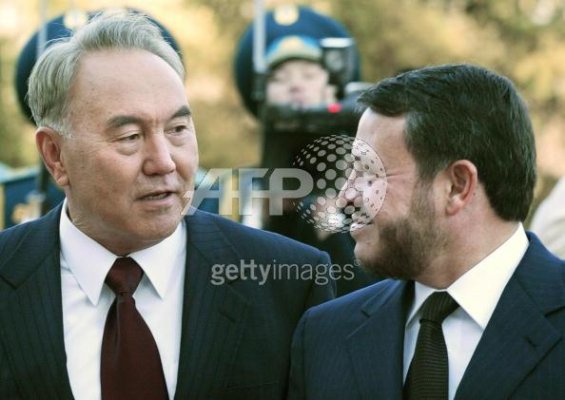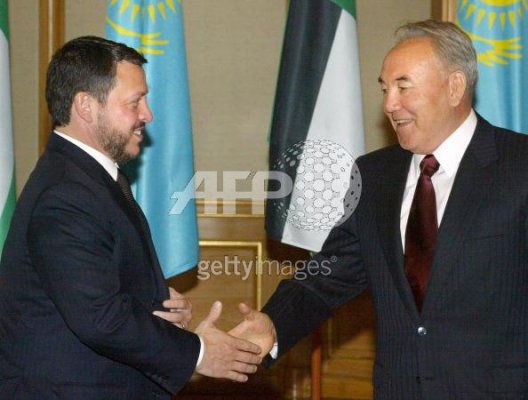I purchased the "People" magazine issue released the week before the bombings featuring Queen Rania. It was apparently done to promote her upcoming US visit (which was cancelled in the wake of the Amman attacks). Some excerpts from the 4 page spread:
Headline: A Very Modern Queen
Subhead: At 35, Rania of Jordan, balances work, motherhood, a leading role in a traditional Arab kingdom--and still has time for Desperate Housewives.
It is late afternoon, a.ka., the Whining Hour--that time when children grow restless and tummies begin to growl. And so Queen Rania of Jordan--Her Majesty to her subjects, Mama to her four young children with King Abdullah--sets about preparing katayef, savory cheese and walnut stuffed pancakes, with the help of her daughters, princesses Iman, 9, and Salma, 5. As the girls and their mom work, a nanny keeps an eye on 10 month old Prince Hashem, while KA, dressed in his off-duty uniform of combat pants and a T-shirt, appears briefly in the family's newly-built palace near Amman. Nearby, the couple's eldest son, Prince Hussein, 11, plays a computer game. "I am influenced by my son," the queen says with a laugh. "I listen to everything from 50 Cents to Coldplay to Alicia Keys to Norah Jones."
Yes, her Majesty Queen Rania--at 35, the world's youngest queen, who presides with her husband over a kingdom that dates back several thousand years--is a Coldplay fan. She's also a fashion designer's darling (Givenchy and Roland Mouret are favorites), a "Desperate Housewives" devotee and an outspoken advocate in her Muslim country for long-taboo causes like women's rights and victims of child abuse. Whether commanding attention at the 2004 World Economic Forum or plopping herself down on the floor with a dozen children at a puppet show to highlight child safety, Rania, as she is called by friends and colleagues, "is the epitome of modern royalty," says her pal Katie Couric. "She is such a terrific spokesperson for her country and the whole region. I'm a full-out gusher when I talk about her."
Unlike her royal counterparts in the west, the Kuwaiti-born Rania--who kicks off a US visit on November 16th to promote Arab-American relations--faces the daunting task of straddling modern and ancient worlds. "She has to constantly be aware of not offending, not stepping too far beyond the bounds of tradition and yet pushing just enough to keep the dialogue going and progress moving forward," says her friend Pat Mitchell, president and CEO of PBS. Rania has used her Jordan River Foundation to establish the country's first-ever center for abused children and to promote small loans for women starting their own businesses--moves that may have ruffled more feathers among Jordan's male-dominated old guard were it not for her smooth political charm.Says Mitchell "she has threaded the needle very carefully."
The balancing act extends to her 12 year marriage, itself a unique mix of traditional and modern mores. Rania praises Abdullah's "really good" barbeque skills; he defers to her modern decorating sense in the hilltop palace they moved into last year (the family also spends time in England and the Jordanian resort of Aqaba). Yet in a region where women traditionally have had a limited voice, "she has a natural ability to reach out," says Abdullah, 43, who unexpectedly ascended the throne in 1999, when his cancer-stricken father, King Hussein changed the line of succession shortly before he died. "We really work as a team," he says. "She covers areas that I am unable to dedicate much time to."
Her life changed forever in January 1993, when she attended a dinner party given by Abdullah's sister, Princess Aisha. "The minute Rania walked in, I knew it right there and then," says Abdullah. "It was love at first sight." His wife is more circumspect. "I knew he was KH's son and I was a bit wary of that," she says. "But I think he was quite interested, and he pursued it and it kind of happened." Five months later, the pair wed. "It was quick," says Rania, speaking in her flawless English. (Arabic is her first language). She says her own commoner's background allowed the romance to blossom naturally. "Nobody knew who I was, which was good."
The anonymity was to be short-lived, particularly after KH's 1999 death. Since then, Hussein's widow, the American-born Queen Noor, spends most of her time in the US and London, telling People in 2003 "I have the impression that it might give (Rania and Abdullah) a little bit more space and ease."
In the years following their accession, the royal couple says they have worked hard to remain as grounded as a couple of married monarchs can be. "We make sure to go to restaurants or go catch a movie somewhere, drive our own cars," says Rania, who often picks up her children from school behind the wheel of her Mercedes SUV (albeit with a security detail trailing her). Safety issues are always in the back of her mind--the late KH who faced opposition for his moderate views, survived several assassination attempts--"but it's not something I think about on a day to day basis," she says.
Instead, the multi-tasking queen, who missed the April wedding of friends Prince Charles and Camilla because she was still nursing Hashem, focuses on priorities: family and work. "It is a constant juggling act," she says. "Achieving that balance is about keeping some of the balls in the air most of the time."


